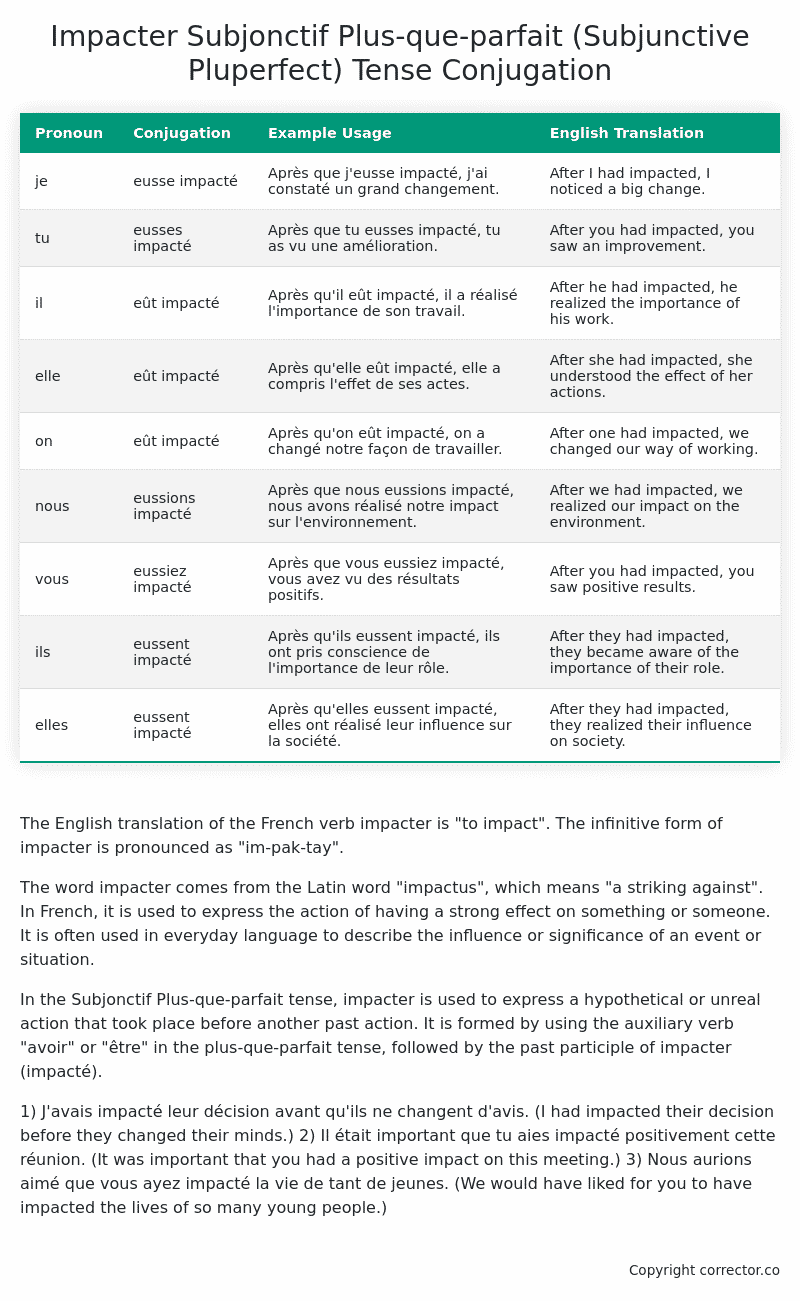Subjonctif Plus-que-parfait (Subjunctive Pluperfect) Tense Conjugation of the French Verb impacter
Introduction to the verb impacter
The English translation of the French verb impacter is “to impact”. The infinitive form of impacter is pronounced as “im-pak-tay”.
The word impacter comes from the Latin word “impactus”, which means “a striking against”. In French, it is used to express the action of having a strong effect on something or someone. It is often used in everyday language to describe the influence or significance of an event or situation.
In the Subjonctif Plus-que-parfait tense, impacter is used to express a hypothetical or unreal action that took place before another past action. It is formed by using the auxiliary verb “avoir” or “être” in the plus-que-parfait tense, followed by the past participle of impacter (impacté).
1) J’avais impacté leur décision avant qu’ils ne changent d’avis. (I had impacted their decision before they changed their minds.)
2) Il était important que tu aies impacté positivement cette réunion. (It was important that you had a positive impact on this meeting.)
3) Nous aurions aimé que vous ayez impacté la vie de tant de jeunes. (We would have liked for you to have impacted the lives of so many young people.)
Table of the Subjonctif Plus-que-parfait (Subjunctive Pluperfect) Tense Conjugation of impacter
| Pronoun | Conjugation | Example Usage | English Translation |
|---|---|---|---|
| je | eusse impacté | Après que j’eusse impacté, j’ai constaté un grand changement. | After I had impacted, I noticed a big change. |
| tu | eusses impacté | Après que tu eusses impacté, tu as vu une amélioration. | After you had impacted, you saw an improvement. |
| il | eût impacté | Après qu’il eût impacté, il a réalisé l’importance de son travail. | After he had impacted, he realized the importance of his work. |
| elle | eût impacté | Après qu’elle eût impacté, elle a compris l’effet de ses actes. | After she had impacted, she understood the effect of her actions. |
| on | eût impacté | Après qu’on eût impacté, on a changé notre façon de travailler. | After one had impacted, we changed our way of working. |
| nous | eussions impacté | Après que nous eussions impacté, nous avons réalisé notre impact sur l’environnement. | After we had impacted, we realized our impact on the environment. |
| vous | eussiez impacté | Après que vous eussiez impacté, vous avez vu des résultats positifs. | After you had impacted, you saw positive results. |
| ils | eussent impacté | Après qu’ils eussent impacté, ils ont pris conscience de l’importance de leur rôle. | After they had impacted, they became aware of the importance of their role. |
| elles | eussent impacté | Après qu’elles eussent impacté, elles ont réalisé leur influence sur la société. | After they had impacted, they realized their influence on society. |
Other Conjugations for Impacter.
Le Present (Present Tense) Conjugation of the French Verb impacter
Imparfait (Imperfect) Tense Conjugation of the French Verb impacter
Passé Simple (Simple Past) Tense Conjugation of the French Verb impacter
Passé Composé (Present Perfect) Tense Conjugation of the French Verb impacter
Futur Simple (Simple Future) Tense Conjugation of the French Verb impacter
Futur Proche (Near Future) Tense Conjugation of the French Verb impacter
Plus-que-parfait (Pluperfect) Tense Conjugation of the French Verb impacter
Passé Antérieur (Past Anterior) Tense Conjugation of the French Verb impacter
Futur Antérieur (Future Anterior) Tense Conjugation of the French Verb impacter
Subjonctif Présent (Subjunctive Present) Tense Conjugation of the French Verb impacter
Subjonctif Passé (Subjunctive Past) Tense Conjugation of the French Verb impacter
Subjonctif Imparfait (Subjunctive Imperfect) Tense Conjugation of the French Verb impacter
Subjonctif Plus-que-parfait (Subjunctive Pluperfect) Tense Conjugation of the French Verb impacter
Conditionnel Présent (Conditional Present) Tense Conjugation of the French Verb impacter
Conditionnel Passé (Conditional Past) Tense Conjugation of the French Verb impacter
L’impératif Présent (Imperative Present) Tense Conjugation of the French Verb impacter
L’infinitif Présent (Infinitive Present) Tense Conjugation of the French Verb impacter
(this article)
Struggling with French verbs or the language in general? Why not use our free French Grammar Checker – no registration required!
Get a FREE Download Study Sheet of this Conjugation 🔥
Simply right click the image below, click “save image” and get your free reference for the impacter Subjonctif Plus-que-parfait tense conjugation!

Impacter – About the French Subjonctif Plus-que-parfait (Subjunctive Pluperfect) Tense
Formation
Common Everyday Usage Patterns
Hypothetical Situations
Reported Speech
Doubt, Wishes, and Emotions
Interactions with Other Tenses
Present Subjunctive
Imperfect Subjunctive
Conditional
Summary
I hope you enjoyed this article on the verb impacter. Still in a learning mood? Check out another TOTALLY random French verb conjugation!


